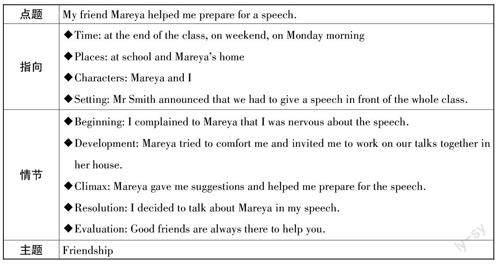巧用修辞,为续写增色
2024-03-26王思
王思

【问题导读】
修辞手法(figures of speech)是根据表达需要,运用有效的语言手段来提高语言的表达效果,使语言表达具有准确性、鲜明性和生动性的语言运用方式。恰当地使用修辞手法,可以使文章更加生动,更具有表现力,蕴意丰富,引人入胜。
常用的修辞手法有:明喻(simile)、暗喻(metaphor)、夸张(exaggeration)、拟人(per?sonification)、排比(parallelism)、对比(contrast)等。
【名师导学】
1. 明喻是英语中最常用的修辞手法之一。它根据人们的联想,利用不同事物之间的相似点,借助比喻词(like、as、as...as、as if、as though、seem等)的连接作用,清楚地说明甲事物在某方面像乙事物,指出两个不同事物的相似之处,使表达生动形象,明白易懂。
2. 暗喻(隐喻),表示把某事物比拟成和它有相似关系的另一种事物。在暗喻的句子里都会出现本体和喻体,连接二者的比喻词则常用“是、变成、成为、就是”等汉语词汇来表示,英语则常用be(am、is、are、was、were)等词来表示甲是乙,而不用like、as等比喻词。
3. 夸张是为了达到某种表达效果的需要,对事物的形象、特征、作用、程度等方面故意夸大或缩小的修辞方法。
4. 拟人是指把非人类的东西人格化,赋予它们人类的思想感情、行动和语言能力。拟人化的范围十分广泛,包括对动物、植物以及其他非生物、各种具体和抽象事物、概念、观念、品质的拟人化。
5. 排比是把结构相同或相似、意思密切相关、语气一致的词语或句子成串地排列的一种修辞方法,利用意义相关或相近、结构相同或相似和语气相同的词组(主、谓、动、宾)或句子并排(三句或三句以上),段落并排(两段即可),达到一种加强语势的效果。
6. 对比是把两个事物之间的异同点进行对比,它是表达思想感情的一種有效方式。它能使事物的特征、性质、状态更加突出,语言色彩更加鲜明,语义作用更为加强。
在续写中适当运用这些修辞手法进行细节描写,能加强文章的表现力和感染力。
【案例导引】
阅读下面短文,根据所给情节进行续写,使之构成一个完整的故事
At the end of the class, Mr Smith announced our assignment for the next Monday wasto talk about someone we were grateful to instead of a book report. Upon hearing it, Icouldn't help complaining to Mareya that I was so nervous about having to talk in front ofthe whole class.
“You've been in at least three plays,” Mareya pointed out.“ If you don't get stagefright in front of those big audiences, why are you bothered by a few kids in our class?”
It was true, but in a play you were part of a group. I shook my head. Plus, there wereso many people I was grateful to. There was no way I could possibly pick just one. Plus,even if I picked one, I'd have no idea what to say. Plus, even if I figured out what to say, Iwas a million?percent positive Id mess up if I tried to say it out loud! I'd be standing therewith everyone staring at me, waiting for words to come out of my mouth.“ Oh, no!” I pulledmy sweatshirt hood (兜帽) over my face, put my hands over my ears and said.“ I don't wantto talk about it!”
But one thing about really good friends who knew you really well was that they didn'talways do exactly what you asked them to. Mareya could be pretty pushy talking of beinghelpful. She scribbled (潦草地写) something on a piece of paper, lifted my hood, andsmiled. Shed drawn a funny elephant with the word BREATHE coming out of its trunk.
“This is Franky, the Everythings?Going?to?Be?All?Right elephant,” Mareya giggled.She held the picture up to her ear and asked,“ What's that you say, Franky? Do you thinkmy friend Arizona should come over to my house this weekend so we can work on our talkstogether?”
注意:续写词数应为150左右。
Paragraph 1:
And that was exactly what happened.________________
Paragraph 2:
On Monday morning, however, I decided to talk about Mareya.____________________
一、故事梳理
本文以人物為线索展开。作者听说下周一他要在全班同学面前演讲,谈一谈自己感激的人,感到非常紧张。作者的朋友玛丽亚为了安慰作者,画了一头“一切都会好起来”的大象,并邀请作者一起去她家里准备这次演讲。
二、修辞使用
(一)排比
原文有两处用到了排比,如第三段的“Plus, there were so many people I was grate?ful to. There was no way I could possibly pick just one. Plus, even if I picked one, I'd haveno idea what to say. Plus, even if I figured out what to say, I was a million?percent positiveI'd mess up if I tried to say it out loud!”中,三个plus引导的句子并排在一起,朗朗上口,有很强的节奏感,增强了文章的表达效果和气势。而且内容上层层递进,更加突出了作者感到紧张的原因。同样,原文第四段的“She scribbled something on a piece ofpaper, lifted my hood, and smiled.”中,scribbled、lifted、smiled三个动作一气呵成,体现了玛丽亚安慰作者、逗乐作者的良苦用心。
在续写的时候,我们也可以模仿原文中使用的排比的修辞手法。由续写部分第一段的首句内容“事实就是这样。”可知,第一段可以描写她们在玛丽亚家里是如何准备演讲的。我们可以这样写:“She then gave me suggestions on whom to talk about,helped me organize my ideas and gave me patient guidance on my gestures, emotions andeye contact.”。同样,根据续写第二段的首句内容可知,此段主要讲作者登台演讲。那么紧张的作者是如何登台演讲的呢?我们可以这样写:“But I finally mustered upcourage, stepped onto the platform, cleared my throat and started my speech.”。这两个句子都是通过一系列的动作来形成排比,加强了语言的气势。
<素材积累>
1. Science is the source of knowledge, the crystallization of wisdom and the sym?bol of civilization. 科学是知识的源泉、智慧的结晶和文明的象征。
2. The conscientious professor always prepares his lecture carefully, intelligentlyand prudentially. 这名一丝不苟的教授总是认真、聪明、细心地准备讲座。
3. I get online sometimes to acquire the information I need, to download themusic and movie I like, and to chat with the friends I miss. 我有时上网是为了获取我所需要的信息,下载我喜欢的音乐和电影,跟我想念的朋友聊天。
4. The quickest way to receive love is to give; the fastest way to lose love is tohold it too tightly; and the best way to keep love is to give it wings. 得到爱最快的方法是给予爱;失去爱最快的方法是紧紧地抓住爱;让爱长驻的最好方法是赋予爱一双翅膀。
5. When you keep saying you are busy, then you are never free; when you keepsaying you have no time, then you will never have time; when you keep saying thatyou will do it tomorrow, then your tomorrow will never come! 当你一直说你非常忙碌,你就永远不会得到空闲;当你一直说你没有时间,你就永远不会有时间;当你一直说这件事明天再做,你的明天就永远不会到来!
(二)明喻
明喻是将两种具有共同特征的事物或现象进行对比,表明本体和喻体的关系。使用明喻的修辞手法可以对事物的特点、特征进行描绘和渲染,使事物形象更加具体,以此引发读者的想象,富有很强的感染力。常用的明喻标志词有like、as、seem、asif、as though、be similar to等。
续写部分的第二段,轮到作者登台演讲时,我们可以这样写:“When my turncame, I became very nervous, with my heart popping wildly like a deer.”。此句将作者的心跳比喻成小鹿跳动,生动地写出了作者此时紧张的心情。
<素材积累>
1. The icy wind started howling, cutting my face like a sharp knife. 寒风开始咆哮,像锋利的小刀一样刺痛了我的脸。
2. The smile on her face shone like a diamond. 她脸上的笑容像钻石一样闪闪发光。
3. I reached out to touch her face, which was as cold as the ice. 我伸手去摸她那像冰一样冷的脸。
4. Mrs Sather looked at my eyes as if (she were) seeing my inner self locked awayinside. 萨瑟老师看着我的眼睛,仿佛看到了内心深处封闭的那个我。
5. Father rushed to his sons school, only to discover the building was as flat as a pan?cake. 父亲冲到儿子的学校后,才发现这座建筑已经变成一片废墟。
(三)暗喻
暗喻是将某一事物的名称用于另一事物,通过比较形成。它能够更生动、更深刻地说明事理,增强语言的表现力。暗喻的本体和喻体之间多通过be动词来连接。
续写部分的第一段,我们可以描写作者问玛丽亚最感激的人是谁,并且可以这样写她的回答:“‘My grandma, she blurted out, feeling a warm current coursing through herbody.”。该句将玛丽亚对奶奶的那份爱比喻为暖流,生动地写出了这份爱的温暖。
<素材积累>
1. The beautiful park was a scented carpet of color. 这个美丽的公园就是一个芬芳的彩色地毯。
2. Her hair was a flowing golden river streaming down her shoulders. 她的头发像是一条流淌在她肩上的金色河流。
3. Life is an unexplored river, full of twists and turns. 生活就像一条未被涉足的河流,充满曲折。
4. He doesn't have an idea of his own. He just parrots what other people say. 他没有自己的观点,只会鹦鹉学舌。
5. The boy wolfed down the food. 这个男孩狼吞虎咽。
(四)夸张
夸张是运用丰富的想象、夸大的言辞,渲染和装饰客观事物,以达到强调的效果。这种修辞手法可以增强表达效果,用来抒发作者或说话人的强烈感情。
在原文的第三段中,作者在讲到自己没有办法完成老师布置的任务时,用了“...Iwas a million?percent positive I'd mess up if I tried to say it out loud!”,这里作者用了“百分之一百万”这种夸张的修辞手法来表达作者觉得自己肯定做不到的心理状态。
根据情节的发展趋势,我们可以推断出作者最终肯定出色地完成了演讲任务。那么,在文章结尾时,我们可以用sb brought the house down with sth来表达这个演讲异常出彩,不仅切合题意,还用夸张的修辞手法增强了表达的效果。
<素材积累>
1. The young girl brought the house down with her performance. 这位年轻姑娘的表演博得了满堂喝彩。
2. When they told me the news, I was on top of the world. 当他们告诉我这个消息时,我乐不可支。
3. It made me jump out of my skin. 这可把我吓坏了。
4. It brought her heart into her mouth. 这让她的心悬到了嗓子眼。
5. She went home in a flood of tears. 她泪流满面地回家去了。
(五)对比
对比是指两种不同的事物或同一事物的两个不同方面的相互比较,是突出差别的一种修辞手法。它使论述结构活跃,使文章内容形象化,具有极强的层次感。
根据续写部分第二段的首句内容可知,作者临时决定把感谢的对象换成玛丽亚。那么,紧接着续写的第一句话应该是作者说明做这个决定的原因。我们可以这样写:“While it was true that there were many people I was grateful to, it was Mareya that Ishould express my gratitude to here and now.”。這句话用while将感谢对象进行对比,突出了选择玛丽亚作为感谢对象的原因,使语言色彩更加鲜明。
<素材积累>
1. In spring, the day is getting longer and longer, and the night shorter andshorter. 春季里,白天越来越长,黑夜越来越短。
2. Motion is absolute while stagnation is relative. 运动是绝对的,而静止则是相对的。
3. The wise man knows he knows nothing; the fool man thinks he knows all. 智者自认一无所知,愚者自负无所不晓。
4. The young man has a glorious future before him and the old man has a splen?did future behind him. 年轻人有著灿烂的未来,而老年人的辉煌已成为过去。
5. Everything was on a large scale for him, the highs were higher, the lows lower.他总是喜欢夸大事实,高的说得更高,低的说得更低。
参考范文
Paragraph 1:
And that was exactly what happened. Mareya and I sat in her house on Saturday after?noon. I asked her curiously who she would pick to talk about.“ My grandma,” she blurtedout, feeling a warm current coursing through her body. From her excited look and gentletone, I could feel her deep gratitude to her grandma. She then gave me suggestions on whomto talk about, helped me organize my ideas and gave me patient guidance on my gestures,emotions and eye contact. She was so helpful that I got prepared for my talk very smoothly.
Paragraph 2:
On Monday morning, however, I decided to talk about Mareya. While it was true thatthere were many people I was grateful to, it was Mareya that I should express my gratitudeto here and now. When my turn came, I became very nervous, with my heart popping wildlylike a deer. But I finally mustered up courage, stepped onto the platform, cleared my throatand started my speech,“ Today, I'd like to talk about Mareya, a friend I will always be grate?ful to.” Hearing my words, Mareya widened her eyes and looked at me in surprise. Uponfinishing the talk, I trotted towards Mareya and gave her a bear hug.“ You brought thehouse down with your speech!” she said.
【模拟导练】
阅读下面短文,根据所给情节进行续写,使之构成一个完整的故事。
Old Man Donovan was a mean man who hated children. He threw rocks at them. Atleast that's what we had heard.
His small farm bordered our neighborhood where my younger sister, Leigh Ann, and Ilived when we were growing up. His farm was long, narrow and quaint. It held two trea?sures. One was his beautiful fruit. There were many varieties of fruit: pears, apples and lotsmore I just can't think of. The fruit naturally drew the children to his land. It made theminto thieves. But my sister and I didn't dare to take his fruit because of the horrible rumorswe had heard about Old Man Donovan.
One summer day, we were playing in a nearby field. It was time to head back home.My sister and I were feeling very daring that day. There was a short cut to our house thatwent through Donovan's farm. We thought he wouldn't be able to see us run across his pro?perty around the luscious fruit trees. We were almost through the farm when we heard “Hey, girls!” in a gruff, low voice. We stopped dead in our tracks! There we were, face toface with Old Man Donovan. Our knees were shaking. We had visions of rocks poundingour bodies and bullets piercing our hearts.
